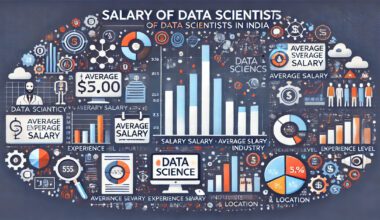Summary: This article delves into five real-world data science case studies that highlight how organisations leverage Data Analytics and Machine Learning to address complex challenges. From healthcare to finance, these examples illustrate the transformative power of data-driven decision-making and operational efficiency.
Introduction
Data Science has emerged as a transformative force across various industries, leveraging vast amounts of data to drive decision-making and innovation. According to a report by McKinsey, companies that harness data effectively can increase their operating margins by 60% and boost productivity by up to 20%.
Furthermore, a survey by Gartner revealed that 87% of organisations view data as a critical asset for achieving their business objectives. With the rise of big data, Machine Learning, and Artificial Intelligence, Data Science is not just a tool but a necessity for businesses aiming to stay competitive in today’s market.
This blog explores five compelling case studies that illustrate the practical applications of Data Science in real-world scenarios. Each case highlights how organisations have successfully implemented data-driven strategies to solve complex problems, enhance customer experiences, and optimise operations.
Key Takeaways
- Pfizer’s predictive maintenance reduced costs by over 20% in healthcare operations.
- Online education platforms improved student completion rates by 30% using Data Analytics.
- Airbnb’s customer insights led to remarkable growth of 43,000% through tailored offerings.
- Financial institutions streamlined loan processing, reducing time by 25% with Machine Learning models.
- GE optimised supply chain management, achieving a 15% cost reduction through predictive analytics.
5 Data Science Case Studies
From healthcare to finance, these examples showcase the versatility and impact of Data Science across diverse sectors. The following case studies illustrate how organisations across various industries have successfully leveraged Data Analytics and Machine Learning to solve real-world challenges, enhance operational efficiency, and drive innovation in their respective fields.
1. Predictive Maintenance in Healthcare: Pfizer
Pfizer, a leading biopharmaceutical company, faced challenges in managing the maintenance of medical equipment used in patient treatment. The unpredictability of equipment failures led to increased costs and potential risks to patient care.
Approach
To address this issue, Pfizer implemented Machine Learning algorithms that analysed historical maintenance data to forecast future maintenance needs. By utilising predictive analytics, they could identify patterns and anticipate failures before they occurred.
Implementation
The implementation involved collecting data from various medical devices and using it to train Machine Learning models. These models were tested for accuracy and reliability in predicting maintenance schedules.
Impact
As a result of this initiative, Pfizer reported a significant reduction in maintenance costs—by over 20%—and improved patient outcomes due to minimised equipment downtime. This case exemplifies how predictive maintenance can enhance operational efficiency in healthcare settings.
2. Enhancing Student Performance: Online Education Platforms
Online education platforms have increasingly sought ways to improve student engagement and performance assessment. Traditional methods of evaluating student progress often failed to capture individual learning needs effectively.
Approach
By leveraging big Data Analytics, these platforms began analysing student interactions, feedback, and performance metrics. This approach allowed educators to tailor their teaching methods based on real-time insights into student needs.
Implementation
Data Scientists developed predictive models that assessed student performance trends and identified at-risk students early in the course. These models utilised various data points, including assignment scores and participation rates.
Impact
The result was a marked improvement in student outcomes; platforms reported increases in completion rates by up to 30%. This case highlights the power of Data Science in personalising education and fostering better learning environments.
3. Customer Insights through Data Analytics: Airbnb
Airbnb has revolutionised the hospitality industry but faced challenges in understanding customer preferences amidst rapid growth.
Approach
To gain deeper insights into customer behaviour, Airbnb employed advanced Data Analytics techniques that analysed booking patterns, reviews, and user interactions on their platform.
Implementation
Data Scientists created algorithms that processed vast datasets to identify trends and preferences among users. This included sentiment analysis on reviews and predictive modelling for pricing strategies.
Impact
These efforts led to an astonishing growth over five years as Airbnb optimised its offerings based on customer insights. The company’s ability to adapt quickly to market demands underscores the critical role of Data Science in driving business success.
4. Loan Eligibility Prediction: Financial Services
In the finance sector, assessing loan eligibility has traditionally been a cumbersome process fraught with risks related to credit assessments.
Approach
A leading financial institution adopted Machine Learning algorithms to streamline the loan approval process by predicting applicants’ creditworthiness based on historical data.
Implementation
The model utilised various factors such as credit scores, income levels, and previous loan histories to assess risk accurately. Data Scientists conducted extensive testing to ensure the model’s reliability and fairness.
Impact
This initiative resulted in a 25% reduction in loan processing time while also improving approval rates for low-risk applicants. The case illustrates how Data Science can enhance decision-making processes within financial services while mitigating risks.
5. Optimising Supply Chain Management: GE
General Electric (GE) faced challenges in optimising its supply chain operations due to inefficiencies and high operational costs.
Approach
GE implemented Machine Learning models that analysed supply chain data to identify bottlenecks and optimise inventory levels across its manufacturing facilities.
Implementation
The project involved integrating various data sources—from supplier performance metrics to production schedules—and applying predictive analytics to forecast demand accurately.
Impact
As a result of these efforts, GE achieved a 15% reduction in supply chain costs and improved delivery times significantly. This case study exemplifies how leveraging Data Science can lead to substantial operational improvements in manufacturing sectors.
Concluding Thoughts
These five case studies illustrate the transformative power of Data Science across diverse industries. By harnessing advanced analytics and Machine Learning techniques, organisations can not only solve complex problems but also drive innovation and enhance customer experiences.
As businesses continue to embrace data-driven strategies, the potential for growth and efficiency will only expand further.
Frequently Asked Questions
What is Data Science?
Data Science is an interdisciplinary field that combines statistics, computer science, and domain expertise to extract insights from structured and unstructured data. It involves techniques like Machine Learning, data mining, and predictive analytics to analyse data and inform decision-making across various industries.
How is Data Science Applied in Business?
Data Science is applied in business through predictive analytics, customer segmentation, and operational optimization. Companies use data to understand customer behaviour, forecast trends, improve efficiency, and enhance products or services. This data-driven approach helps organizations make informed decisions that drive growth and competitiveness.
What Skills are Essential for a Career in Data Science?
Essential skills for a career in Data Science include proficiency in programming languages (like Python or R), statistical analysis, Machine Learning, and data visualisation. Additionally, strong problem-solving abilities and domain knowledge are crucial for interpreting data effectively and translating insights into actionable strategies.


